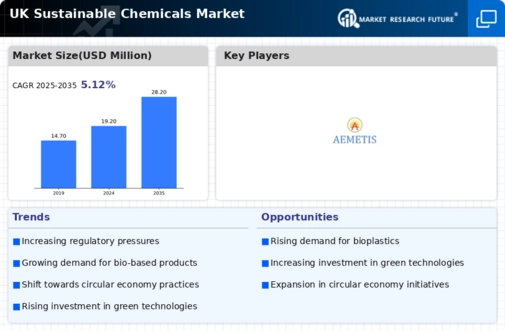Top Industry Leaders in the UK Sustainable Chemicals Market

The UK's sustainable chemicals market is blossoming, driven by a confluence of factors: rising environmental concerns, government policies favoring greener solutions, and a growing consumer demand for eco-friendly products. This fertile ground has attracted a diverse range of players, each vying for a share of the burgeoning market
Competitive Strategies:
-
Innovation and R&D: Leading companies like Johnson Matthey, INEOS, and Croda International are investing heavily in research and development to create bio-based and biodegradable alternatives to traditional chemicals. This includes bioplastics, renewable feedstocks, and enzymatic processes. -
Circular Economy: Players like Unilever and BASF are embracing circular economy principles by repurposing waste streams into valuable resources. This reduces dependency on virgin materials and minimizes environmental impact. -
Partnerships and Acquisitions: Collaborative efforts are driving innovation and market expansion. Partnerships are seen between chemical companies and biotechnology startups, universities, and waste management firms. Recent examples include BASF's collaboration with LanzaTech on renewable ethanol production and Croda's acquisition of Plant Lipids, a plant-based oils specialist. -
Sustainability Reporting and Transparency: Companies are increasingly focusing on ESG (Environmental, Social, and Governance) principles to attract investors and gain consumer trust. They are publishing detailed sustainability reports, setting ambitious carbon reduction targets, and implementing green manufacturing practices.
Factors Influencing Market Share:
-
Product Portfolio: Companies with diverse offerings catering to various industries like construction, textiles, and personal care hold an advantage. -
Technology Adoption: Early adopters of innovative technologies like biocatalysis and advanced recycling processes gain first-mover advantage and market share. -
Government Initiatives: The UK government's policies like the "Clean Growth Strategy" and "Net Zero Strategy" provide financial incentives and support for sustainable chemical technologies, benefiting companies aligned with these goals. -
Brand Reputation: Companies with established reputations for sustainability and ethical practices attract environmentally conscious consumers.
Key Companies in the Sustainable Chemicals market include
- Mitsubishi Chemical UK Limited
- Cargill PLC
- BASF SE
- Arkema UK Limited
- Toray International UK Ltd. (TIUK)
- Evonik Industries AG
- DSM United Kingdom Limited
- Aemetis, Inc.
- Albemarle Corporation
Recent Developments
October 2023: Johnson Matthey announces a £1 billion investment in green hydrogen production, aiming to become a leader in clean fuels.
November 2023: INEOS partners with Plastic Energy to build a large-scale advanced recycling plant in Scotland, converting plastic waste into new chemicals.
December 2023: The UK government launches a £100 million fund to support innovation in sustainable chemicals technologies.

